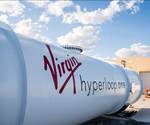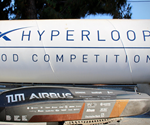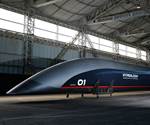SGL Carbon supports student Hyperloop prototype from TUM
Hyperloop prototype developed and built by students at the Technical University of Munich will compete in this year’s Space X Hyperloop pod competition on July 21 in Los Angeles.
With the support of SGL Carbon (Wiesbaden, Germany), students at the Technical University of Munich (TUM, Munich, Germany) have developed an optimized Hyperloop prototype and presented their innovation mid-June in Munich.
The Hyperloop capsule (also referred to as a “pod”) represents their contribution to Tesla CEO Elon Musk’s Hyperloop competition that will be held July 21 in Los Angeles. Since the Hyperloop competition began in 2017, TUM students have received support and carbon fiber materials from SGL Carbon — this year as a gold sponsor. The team from TUM took first place in 2018, its pod traveling through the 1,200 meters test tube at a velocity of 467 km/h.
“The pod has to be especially light, but at the same time extremely stable to withstand the loads of the high speeds in the tube,” explains Paloma García Guillen, Structure Team Lead for the TUM team. “Thanks to the support from SGL Carbon, we were able to test out different material variants.”
The team used a pre-impregnated woven carbon fiber material (prepreg) from SGL Carbon. Based on design and material optimizations, the carbon component of the current pod weights around ten percent less than the previous model (5.6 kilograms compared to 6.1 kilograms). In addition, the mounts for the shell are now built completely out of carbon, instead of the previous plastic solution, cutting the weight in half from 1.5 kilograms to just 700 grams.
“It’s impressive to see what the young team of 51 students from 20 countries achieved in such a short amount of time,” says Dr. Christoph Ebel, Head of the Lightweight and Application Center at SGL Carbon. “From the idea, to prototype development, to the finished part, the team only needed a few months.”
He adds, “Behind the Hyperloop pod design are numerous innovative ideas based on modern lightweight construction, challenging to realize technologically. We are excited to have the students on our side as partners and wish the team the best of luck for their competition.”
Besides sponsoring the hyperloop team, SGL Carbon has also supported the carbon composites endowment chair (LCC) at TU Munich for eight years, which is focused on a holistic approach to and development of fiber-reinforced composites and their application.
Related Content
-
PEEK vs. PEKK vs. PAEK and continuous compression molding
Suppliers of thermoplastics and carbon fiber chime in regarding PEEK vs. PEKK, and now PAEK, as well as in-situ consolidation — the supply chain for thermoplastic tape composites continues to evolve.
-
Plant tour: Albany Engineered Composites, Rochester, N.H., U.S.
Efficient, high-quality, well-controlled composites manufacturing at volume is the mantra for this 3D weaving specialist.
-
3D weaving capabilities achieve complex shapes, reduce weight and cost
JEC World 2024: Bally Ribbon Mills is displaying film-infused 3D woven joints, woven thermal protection systems (TPS) and woven composite 3D structures.
















